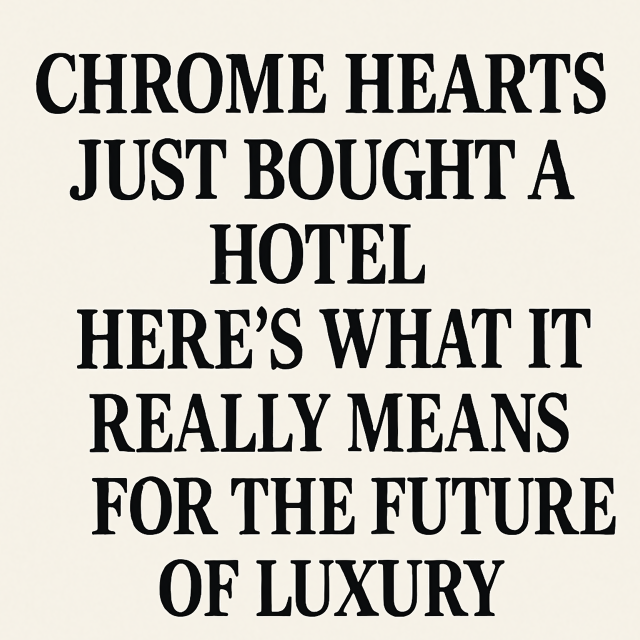Luxury isn’t a product anymore.
It’s an ecosystem.
And Chrome Hearts, the Los Angeles luxury label known for its rebellious aesthetic and cult following, just made that unmistakably clear by purchasing The Surfrider Malibu, a 20-room boutique hotel perched above the Pacific Coast Highway, for 37.5 million dollars.
Most brands buy retail space.
Chrome Hearts bought an entire world.
Here’s why that matters and what it reveals about where luxury, hospitality, and consumer psychology are heading.
The Hotel as the New Flagship Store
For decades, luxury brands signaled their power through flagship stores in New York, Paris, and Tokyo. But physical retail isn’t the status symbol it once was.
A store captures a moment.
A hotel captures your entire environment.
When a brand owns the hotel, it owns how you sleep, what you smell, what you hear, what you post, and ultimately how you feel
A hotel is a flagship you live inside.
That is a deeper emotional imprint than any storefront can deliver.
The Rise of Experiential Luxury
The next generation of luxury consumers is not motivated by accumulating things. They are motivated by accumulating memories, experiences, and identity cues.
Luxury products say Look what I have.
Luxury experiences say Look who I am.
Hospitality delivers something no item in a shopping bag can compete with: immersion.
This is why brands such as Louis Vuitton, Armani, and Ralph Lauren have invested in cafés, restaurants, and hotels.
The modern luxury game is not about selling items.
It is about building worlds.
Hospitality as a Content Engine
Chrome Hearts did not simply purchase a hotel.
They purchased a stage.
Every boutique hotel today functions as a content studio. It is designed to be photographed, shared, and broadcast. The Surfrider, when infused with the Chrome Hearts aesthetic, becomes a curated backdrop, a story accelerator, and a digital billboard with ocean views.
Influencers do not just stay at these hotels.
They amplify them.
For a brand known for edge and cultural influence, hospitality becomes organic distribution.
Membership, Not Ownership: The New Luxury Psychology
There is a clear shift happening in luxury psychology. Consumers increasingly want access, intimacy, community, and repetition rather than single-point transactions.
Hotels check every box.
Exclusive access
Limited availability
Curated community
Recurring revenue
Emotional belonging
Chrome Hearts is not just offering a room. They are offering identity through belonging.
That is the real product.
The LTV Power Play: Hospitality Unlocks Data and Loyalty
From a marketer’s perspective, no environment reveals more about a customer than a hotel stay.
Brands gain insights into what guests eat, when they sleep, how they relax, what they purchase, and how they behave digitally and socially.
This is zero-party data disguised as a vacation.
With that comes the holy grail of luxury marketing: lifetime value.
A guest who loves the experience becomes a recurring buyer across fashion, fragrance, lifestyle, travel, and beyond.
Hotels are loyalty accelerators disguised as escapes.
Luxury Brand Worlds Are Expanding
Chrome Hearts' stepping into hospitality is not a one-off experiment. It is part of a global shift.
Across the luxury landscape:
Ralph Lauren has restaurants
Armani has hotels
Louis Vuitton is developing branded experiences
Equinox launched hotels for the athletic elite
Aman has created a global community around wellness
The most advanced luxury brands are expanding vertically into environments, not just merchandise.
Chrome Hearts buying The Surfrider Malibu is a world-building move and likely the first of many.
Expect to see Chrome Hearts retreats, villas, beach clubs, wellness experiences, and travel partnerships.
This is not about rooms.
It is about realms.
What This Means for Hospitality
This acquisition signals a real shift that the travel and hospitality industry needs to pay attention to.
Hospitality will continue to become a platform for luxury branding. Boutique hotels will become acquisition targets. Experiential travel will drive loyalty. Content will be built into the architecture. Brand identity will live inside physical environments.
The world's consumers want to live in will increasingly be built by the brands they already love.
Chrome Hearts simply moved early.
The Takeaway
Luxury brands used to sell you a hoodie.
Now they want to design the environment you wear it in.
Chrome Hearts did not buy a hotel to house guests.
They bought it to house identity.
This is the future of luxury, and it will reshape hospitality as we know it.

